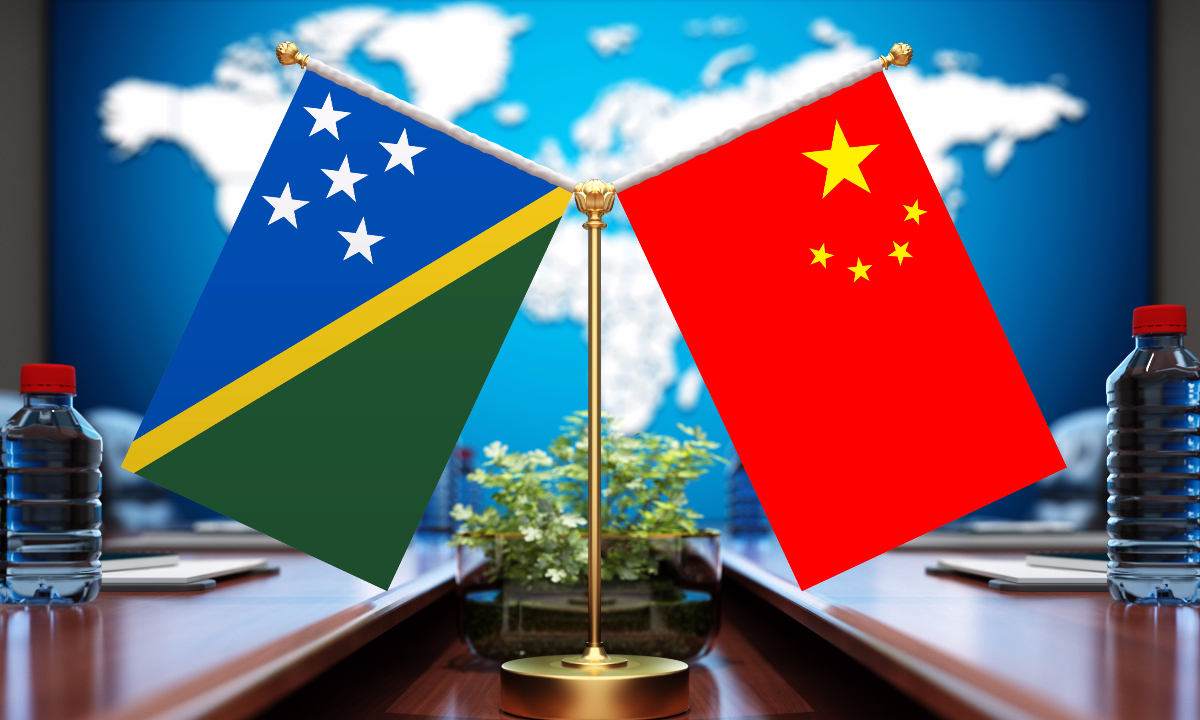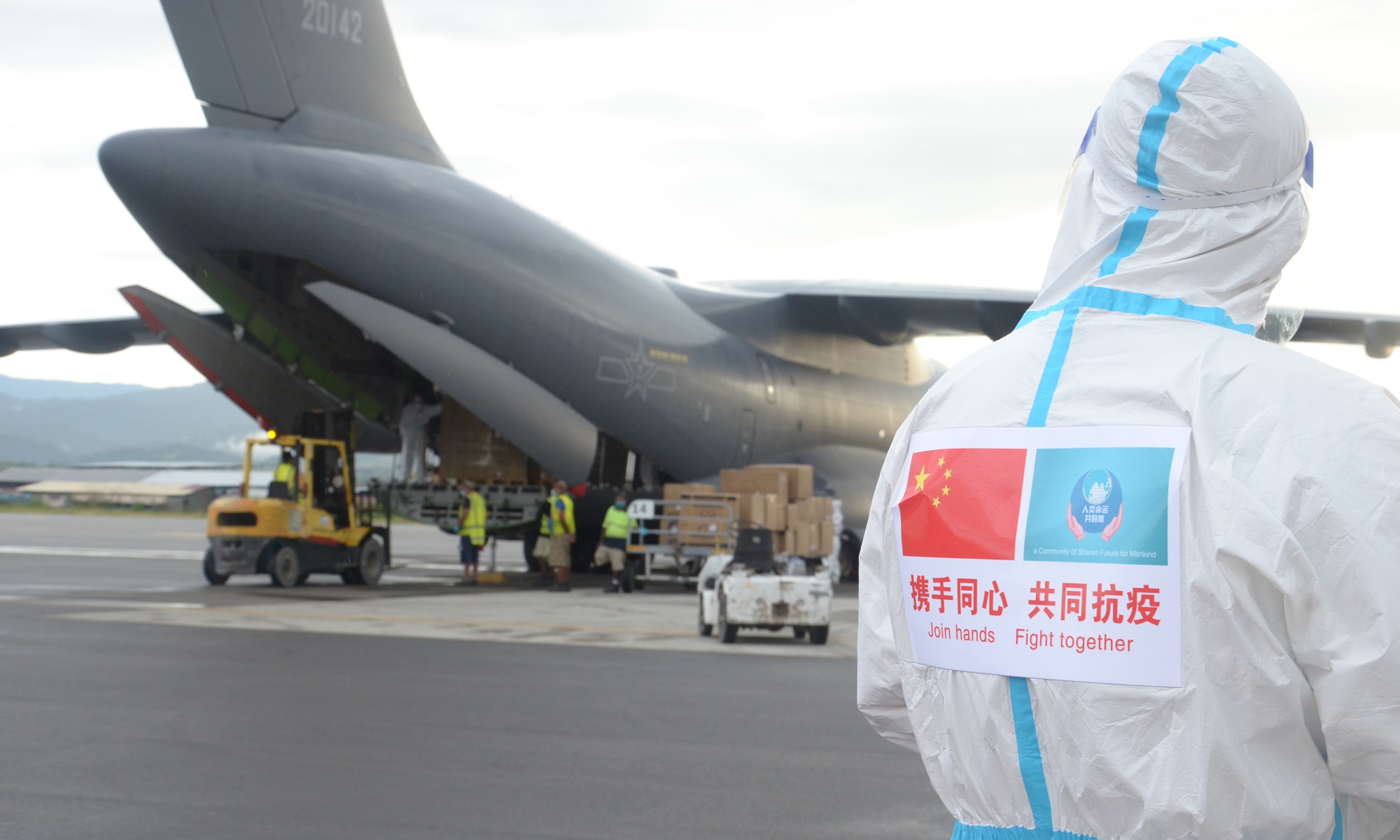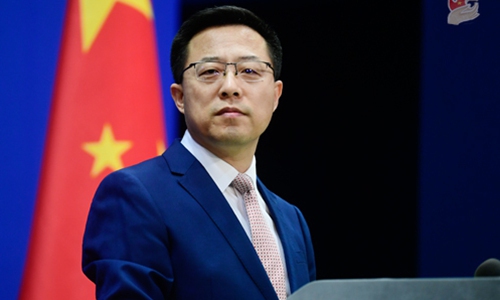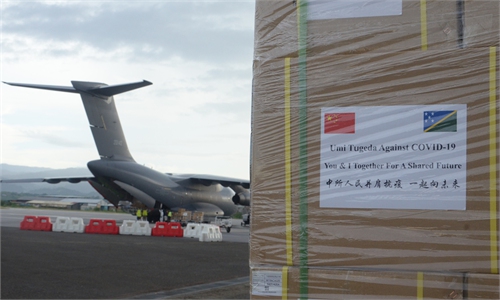Ignoring the facts, needs of China-Solomon Islands security cooperation and hyping groundless accusations on China show Western arrogance, hegemony: experts

Photo: VCG
While China and the Solomon Islands inked a bilateral security pact a week ago, hype from Western countries, particularly Australia and the US, has never stopped, with continuous speculations on China's so-called "real intentions" of "militarizing the region."
However, such accusations are not only groundless, but also show how arrogant these Western countries are with the US as the only country to hold several major military bases in those island countries putting the region under its control alongside its allies, experts noted.
In fact, according to the Chinese Embassy in the Solomon Islands, based on the pact, cooperation on security between China and the Solomon Islands will focus on natural disaster response, humanitarian assistance, development assistance, and maintenance of social order and other fields. "These cater to the real situation and needs of the Solomon Islands," experts said.
The cooperation does not target a third party, said the spokesperson of the Chinese Foreign Ministry, Wang Wenbin, during a news conference on March 31. "Pacific countries are a big stage of international cooperation, not some certain country's 'backyard' nor a venue for the competition of great powers," he noted.
The actual needs
The riots that took place in Solomon Islands' capital, Honiara, last November left great losses for Chinese nationals in the city, most of whom are retailers, as their shops were smashed, burned and looted and their personal safety was put in jeopardy.
Some of them lost all their savings of a decade of efforts, while some reached by the Global Times said that they had decided to leave the country after the chaos.
Although the riots were caused by the disagreement between the central and local governments of the islands, the Chinese community is often the victim of social instability. After the riots, the Chinese Embassy in the Solomon Islands also published two criminal cases on damages to the properties of members of the local Chinese community in February and March.

Flames rise from buildings in Honiara's Chinatown on November 26, 2021 as days of rioting have seen thousands ignore a government lockdown order, torching several buildings around the Chinatown district including commercial properties and a bank branch. Photo: AFP
The security cooperation between China and the Solomon Islands "came about because of the riots in Honiara for the past years and Chinese businesses are always the victim," Frank Sade Bilaupaine, Policy Consultant at the Foreign Policy Advisory Secretariat of the Solomon Islands Government, told the Global Times."So, the Solomon Islands government views it as, since now we have official diplomatic relations, maybe China can assist in building the capacity of the Solomon Islands police," Sade said.
Cooperation on police affairs came after the riots. In December 2021, and January and February 2022, along with virus prevention supplies, China also sent police supplies and equipment to the Solomon Islands. An interim Chinese police advisory group was also dispatched to the island country on January 26.
The group opened the police affairs training program on March 14. Zhang Guangbao, the group's leader, said that the training would be carried out in six batches based on the actual situation of the police, and its content includes the use of equipment, police skills and riot control.
Li Ming, the Chinese Ambassador to the Solomon Islands, said that the riots in November let the two countries saw the importance of cooperation on security, which is based on equality and mutual respect, and does not conflict with Solomon Islands' police cooperation with other countries.
In recent years, China has carried out fruitful police cooperation with Papua New Guinea, Fiji, Vanuatu and other Pacific island countries, and has reached numerous achievements in combating transnational crime, promoting anti-epidemic cooperation, and protecting the safety of Chinese citizens, institutions and major projects overseas. The results have effectively maintained regional peace and stability, according to Ambassador Li.
The cooperation is welcomed by the local Chinese community.
A Chinese businessman surnamed Lin based in Honiara told the Global Times on Thursday that the Chinese community greatly supports the cooperation on security. Lin said that the police in the island country lack professional training and their equipment is outdated. "We hope their police force can improve after cooperation with China."
'It changes everything'
China and the Solomon Islands inked a bilateral security cooperation framework agreement on March 30, the Chinese Foreign Ministry confirmed the next day. Before that, the pact had drawn the attention of media outlets and politicians in Australia and its allies, who hyped that with the pact, China was aiming to build a military base in the Solomon Islands.
Although Manasseh Sogavare, Prime Minister of the Solomon Islands, and Zhao Lijian, spokesperson of the Chinese Foreign Ministry, have denied the rumor on the alleged plan for a military base, some Western media choose to turn a blind eye and a deaf ear on the facts and decided to use their imagination.
"The China-Solomon Islands security deal changes everything," an article published on Tuesday by The Diplomat claimed. With a "leaked draft" as an "evidence," the article deduced that the security pact will "permit Beijing enormous inroads into the Solomon Islands."
The reports also came with threats. "The regional security egg has been scrambled," read an article of Australian Strategic Policy Institute titled "In signing deal with China, Solomon Islands has broken the trust of its Pacific neighbours."

An Australian soldier is watched by young boys during a community engagement patrol through Honiara, Solomon Islands on November 27, 2021.Photo: VCG
"A few people spread rumors and even threatened to invade the Solomon Islands to overthrow the current government. It is clear who is maintaining the stability of the Solomon Islands and who is trying to incite tension," said the Chinese Embassy in a statement on April 2.
"It is no different from the security cooperation between the Solomon Islands and Australia, New Zealand, Papua New Guinea and other countries," it read.
Solomon Islands scholar, Tarcisius Kabutaulaka, also refuted the rumors by saying that "China is unlikely to build a naval base in the Solomon Islands. Foreign military outposts are not how Beijing operates," highlighting that "it currently has only one overseas base in Djibouti in the Horn of Africa. This is in contrast to the United States, with an estimated 750 bases in 80 countries."
"Australia also would like to provide a supporting role to maintain a regional order that is underwritten by US superiority in the region," Jade Guan, a China scholar from the Deakin University, was quoted in a report by ABC.
End of an age
It is not the first time that the Western media and politicians seek to hype any action by China in the southern Pacific. In recent years, cooperation between China and South Pacific island countries in various fields has flourished although it has been followed by such baseless speculations, accusations and attacks.
Rumors that "China is building a military base in the South Pacific island country" are not uncommon. Reporting from the deserted beaches in Vanuatu and Samoa, Australian media fabricated the lie that "China will build a military base here and on the doorstep of Australia."
"A wharf in Fiji that is related to China was also hyped with rumors of military use by China. However, year after year, it is still a wharf and no military force has shown up there […] It is all normal and peaceful," Yang said.

A Chinese PLA Air Force Y-20 transport aircraft carrying medical supplies arrives in Honiara, capital of the Solomon Islands, on February 18. Photo: Global Times
Actually, in the northern and southern Pacific, most countries are closely related to the two big powers: US and Australia. Countries like Micronesia and the Marshall Islands rely on the US for their security with agreements which have allowed the US to "manage" their military and diplomatic affairs, said Yang.Therefore, smearing China's existence and its cooperation with these island countries reveal the traditional double standards of Western countries, Yang noted. "They stand at the moral high ground to badmouth China just to maintain their hegemony in the Pacific," he said.
However, experts noted that the environment on the Pacific has been changing. Nowadays, the Solomon Islands follows its foreign policy motto of "Friends to all and enemies to none."
"The South Pacific island country has gone through two periods of colonialism, imperialist rooting and equal treatment with China, before and after independence," said Yu Lei, chief research fellow at the Research Center for Pacific Island countries at the Liaocheng University, in East China's Shandong Province.
The government and people of the island country have their judgement. Global experience has shown that no country in the world has been recolonized or exploited because of its close economic and trade cooperation with China or has been caught in a debt trap, Yu noted.
It is already the time for these island countries to shake off the control of the big powers like the US, Yang said, adding that "it should not be denied that some countries have found that they could benefit from both China and the US."



